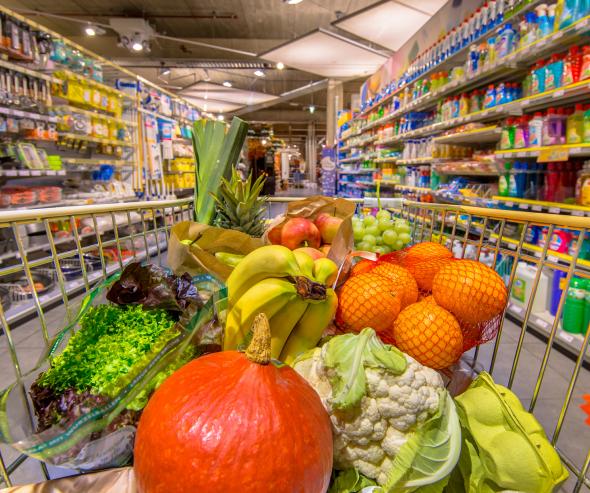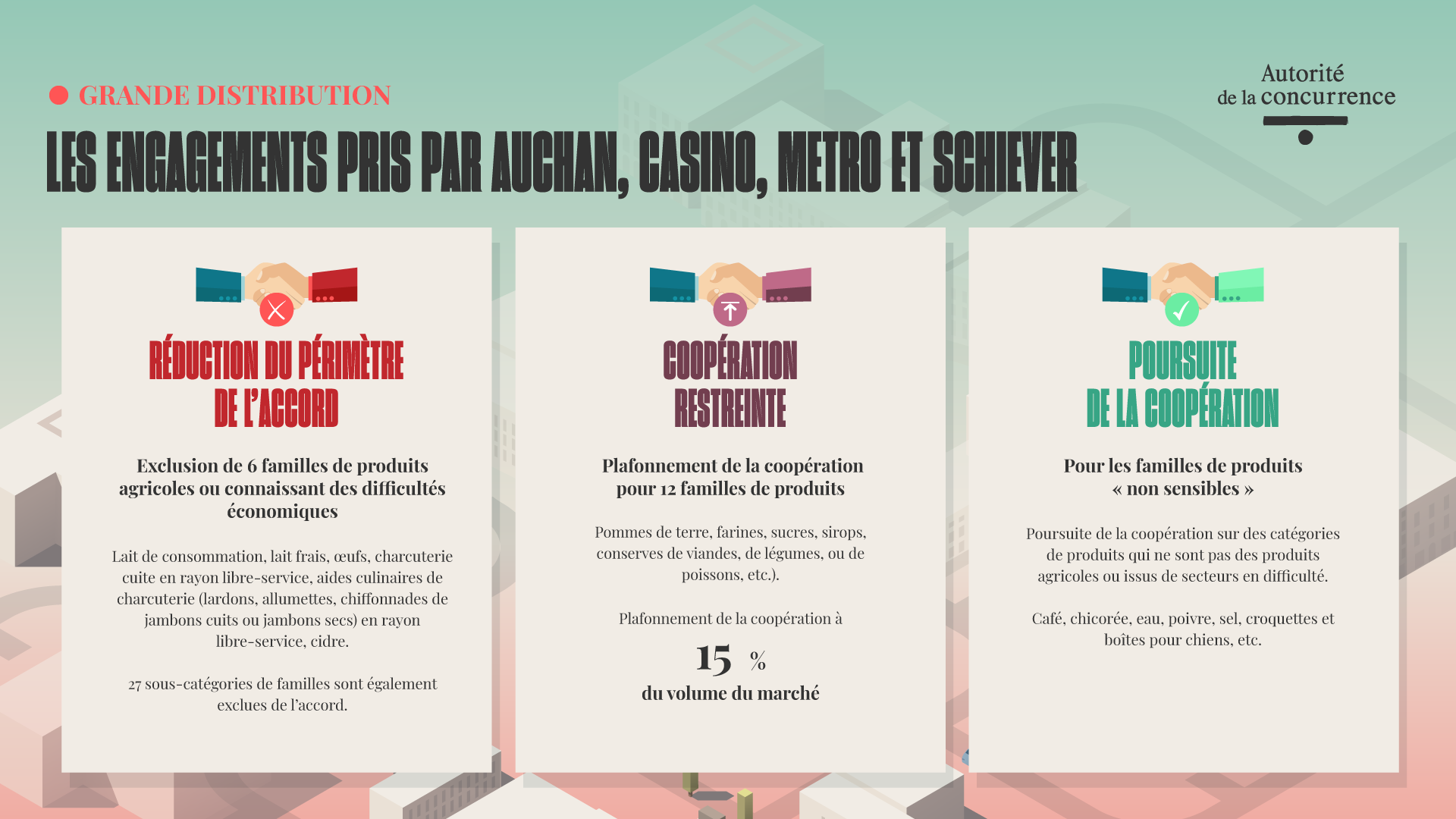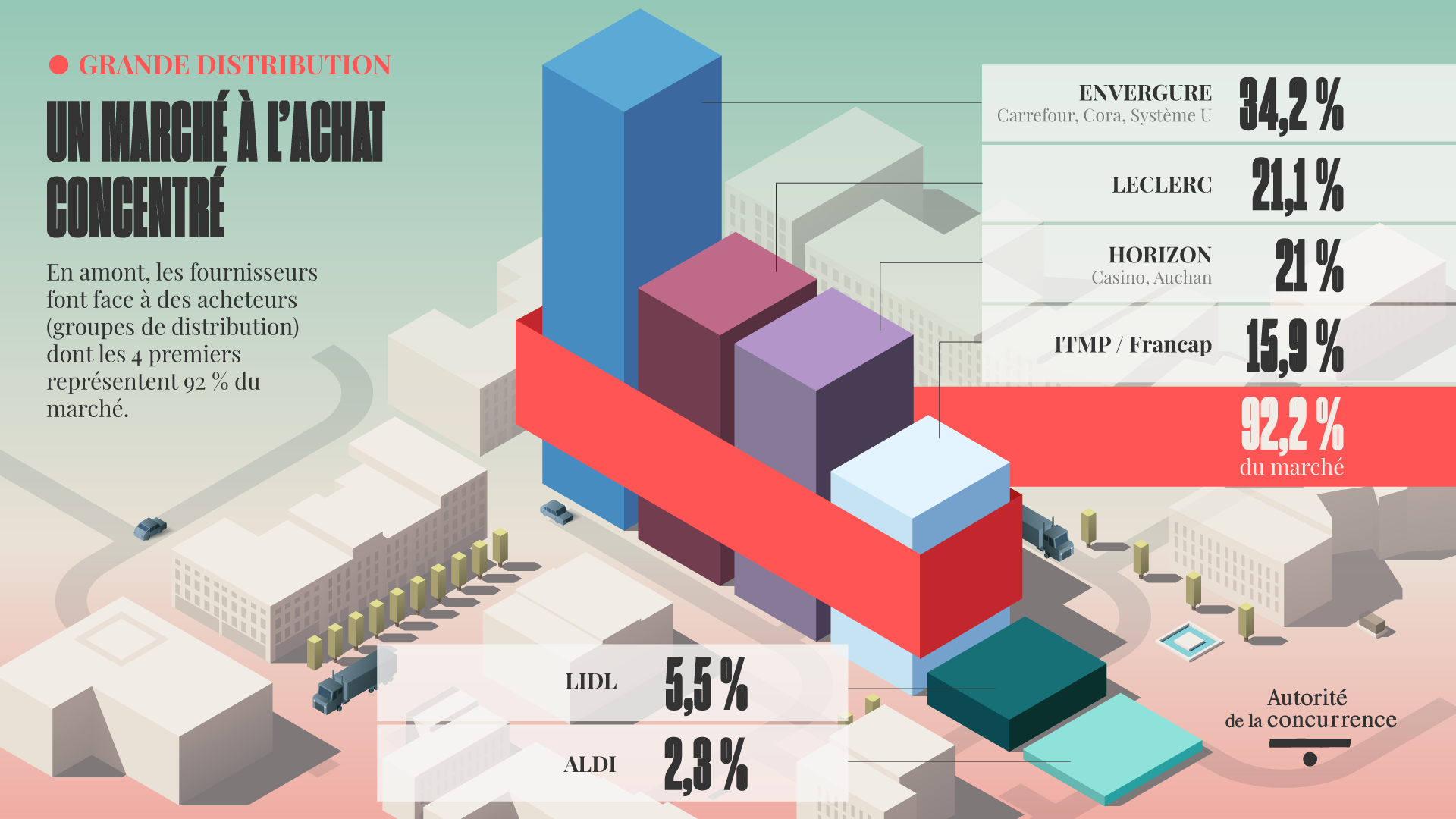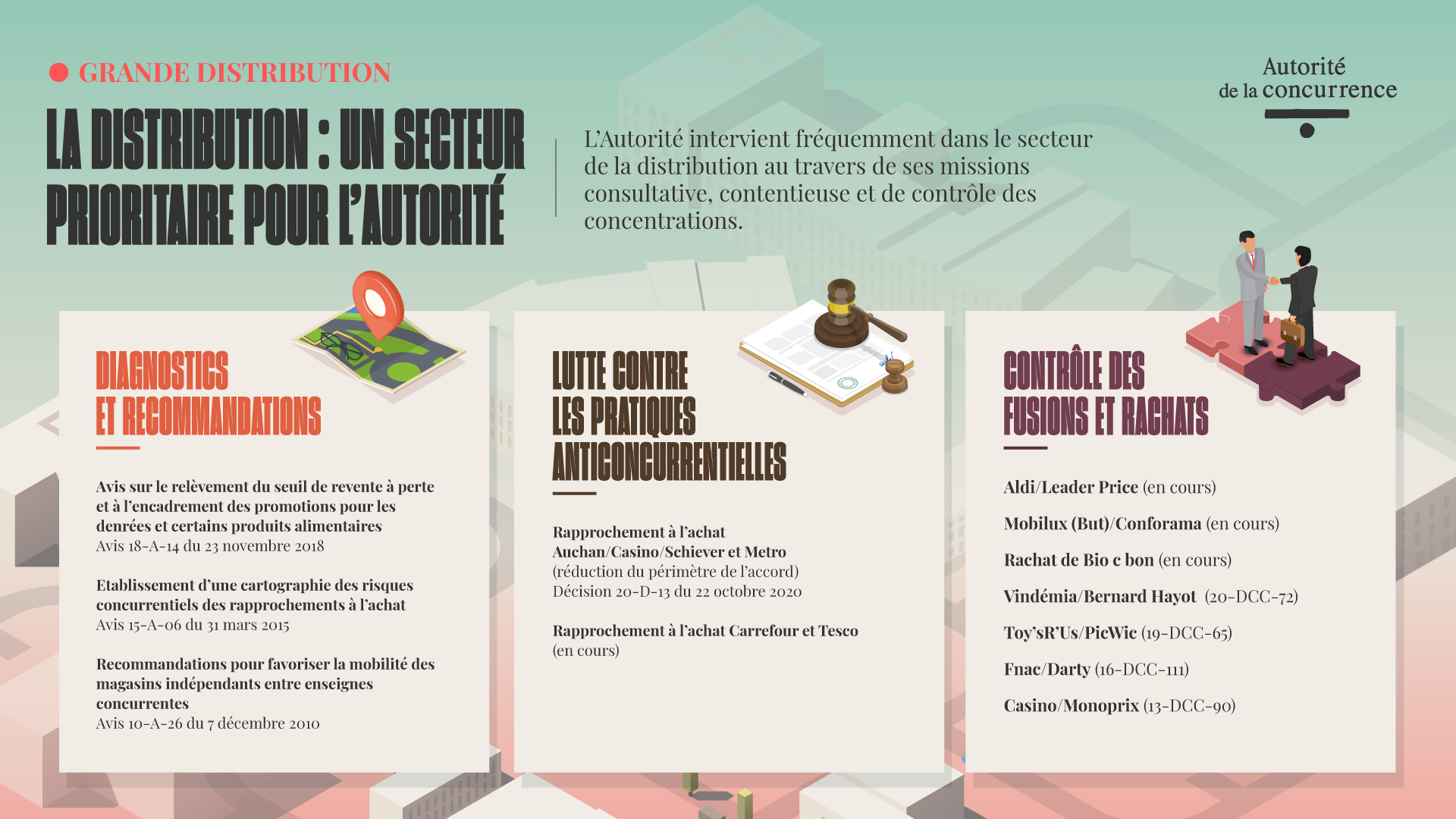Purchasing offices: the Autorité accepts the commitments proposed by Casino, Auchan, Metro and Schiever

Purchasing offices: to address the risks of harm to upstream and downstream competition identified in the process of requesting urgent interim measures, the Autorité accepts the commitments proposed by Casino, Auchan, Metro and Schiever.
The brands will amend the existing cooperation agreement on retailers’ own-brand labels and will reduce the scope of joint purchases of these products.
Certain families of agricultural products (milk, eggs) and products from struggling sectors (cooked cold meats, cider) are now excluded from the agreement, and the joint purchase volumes for others will be reduced to 15% maximum.
Background
The Autorité started proceedings ex officio and in July 2018 began several investigations to determine whether the joint purchasing agreements notified to it in May and June 2018 were harming competition. Following this examination, which led to wide consultation of suppliers and trade bodies, the Autorité’s Investigation Services proposed ordering interim measures within the new framework set by the Egalim Law on 30 October 2018. This allows the Autorité to suspend purchasing agreements if they have anticompetitive effects. To address competition concerns identified in relation to the part of their agreement on retailers’ own-brand labels, Casino, Auchan, Metro and Schiever proposed some commitments. The Autorité accepts these commitments, which will modify the existing agreement as regards the supply of retailers’ own-brand labels and reduce its scope by excluding several families of agricultural products (milk, eggs) and products from sectors in economic difficulty (cooked cold meats, cider). The brands will also reduce their cooperation on other product families so as not to exceed a weight of 15% of market share.
This decision, the Autorité’s first on joint purchasing agreements since the Egalim Law, which strengthened its powers of intervention, will ensure joint purchasing agreements are better adapted to the market situation, particularly of upstream markets, and to the situation of the businesses affected by them, particularly SMEs and very small businesses, which represent a significant share of the suppliers of retailers’ own-brand labels. It aims, first of all, to avoid that these agreements from adversely affecting suppliers’ ability to invest and to offer innovative products and then maintain a sufficiently diversified product range of retailers’ own-brand labels for consumers.
Joint purchasing agreements
For some years, especially in France, joint purchasing agreements between companies competing in upstream markets (the markets in which the products concerned are bought), which, as in this case, are sometimes also competing in downstream markets (the markets in which the products concerned are sold), have proliferated in the major food retailer sector. The reconfiguration in 2018 of alliances forged in 2014 led to three new joint purchasing agreements signed between:
- Auchan, Casino, Metro and Schiever;
- Carrefour and Tesco; and
- Carrefour and Système U
In 2018, Casino, Auchan, Metro and Schiever signed agreements setting up their joint purchasing office, Horizon, part of which concerns the supply of retailers’ own-brand labels products (MDD Agreement and MDD International Agreement). In accordance with the Law for Growth, Activity and Equal Economic Opportunities of 6 August 2015 (Macron Law), the brands communicated these agreements to the Autorité.
As a result of this transmission, the Autorité opened a litigation investigation into these agreements and, following on from this, started proceedings ex officio into the merits in May 2019 and then took interim measures in September 2019 on the grounds of the specific mechanism for purchasing offices introduced by the Egalim Law[1]. The investigation identified competition concerns in relation to retailers’ own-brand labels, which led to the Investigation Services notifying the parties of a proposal to order interim measures.
[1]Since the Egalim Law of 30 October 2018, the Autorité has had the power, in matters of joint purchasing agreements, to start proceedings ex officio in urgent interim measures, which may lead to the suspension of agreements.
Competition concerns raised by the Auchan/Casino/Metro/Schiever agreement concerning retailers’ own-brand labels’ products
Under the MDD Agreement between Casino, Auchan, Metro and Schiever, if at least two of the brands so desire, they may organise calls for tender, via a joint company set up for this purpose, for the joint manufacture of retailers’ own-brand label products. Calls for tender may be issued for up to 46 product families (milk, eggs, cooked cold meats, canned fish, canned meats, breaded fish, aperitifs, digestifs, etc.), including organic, premium and regional products. The table below lists the retailers’ own-brand labels concerned, for each brand.
| Brands | Retailers’ own-brand labels |
|---|---|
| Auchan (including the franchisee Schiever) | Auchan ; Auchan Bio ; Mmm ! ; Pouce ; Rik & Rok ; Auchan Baby ; Actuel |
| Casino | Franprix; Leader Price; and the different brands sold in Monoprix stores: Monoprix Gourmet; Monoprix P’tit Prix; Monoprix Bio; Monoprix Vert; Monoprix la Beauté; and Bout’Chou |
| Metro | Horeca Select, Rochambeau, Aro, Gilbert, Artisans & Talents (bakery products), Rustadou (fresh meat), Jemsa, Veuve Pelletier (wine), Metro Chef (food products for hotels and catering establishments), Metro Chef spécial artisan-boulanger and Felsgold |
During the investigation, the MDD Agreement raised competition concerns about its effects on suppliers on the one hand, and consumers on the other.
- Risk of weakening suppliers, particularly SMEs and very small businesses
The upstream supply market is beset by contractual conditions that generally tend to be unfavourable to suppliers (lack of exclusivity in the manufacture of retailers’ own-brand products, short-term contracts rarely lasting more than a year, absence of volume commitments from distributors), which limits their market power.
The sector is also suffering from a decrease in total sales volumes[2] and relatively low profitability for manufacturers, which could worsen with the proliferation of joint purchasing agreements. By cutting suppliers’ margins, the agreements could, in the short and medium term, reduce suppliers’ ability to invest and to innovate in terms of product formulation and product packaging. They could also reduce suppliers’ incentive to stay in the market.
In addition, unlike for manufacturer brand products, a significant share of the supply of retailers’ own-brand labels is produced by small businesses (SMEs, very small businesses), which by their nature are more exposed to sudden changes in the marketing conditions for their products, such as price decreases or volume loss.
However, although the specifications of own-brand products are ultimately defined by the retailer, the development process also involves the suppliers upstream, during the product design phase. So for some products, suppliers can play an important role in innovation.
The implementation of partnership agreements could thus weaken companies that are part of the innovation process for retailers’ own-brand label products, with the risk that the ability and indeed incentive for suppliers to invest and to innovate is reduced, harming consumers’ well-being in the retail market.
- Risk of reduced diversity of prices and products for consumers
The partnership agreement signed by Auchan/Casino/Metro and Schiever on retailers’ own-brand labels is also likely to limit competition between the brands in the major food retailer market. It will enable Auchan/Casino/Metro/Schiever to jointly select and negotiate with their own-brand label suppliers, and therefore to market own-brand label products with identical characteristics, reducing the variety of the product range available in their stores. Variety of product range is a very important differentiating factor between brands on these products: reducing it is likely to diminish competition between distributors.
In addition, unlike for manufacturer brand products, during development of both the formulation and packaging of retailers’ own-brand label products, suppliers communicate with distributors to ensure they meet their needs. However, the retailers’ own-brand label market is in a particularly strategic phase because of structural changes in current consumption habits, such as the increasingly widespread use of scoring and consumer information apps (e.g. Yuka) and the recent large-scale deployment of Nutri-score labelling for food products, which could increase the incentive for distributors to differentiate themselves by reformulating the recipes of their retailers’ own-brand label products. Consequently, competition between distributors could be reduced if they discuss the characteristics of the products they want to buy jointly and ultimately issue joint calls for tender for the supply of those products.
Because they could cause partial homogenisation of the products sold by the distributors, the agreements are therefore likely to reduce competition between the brands.
Commitments made: an importantreduction in the scope of the joint purchasing partnership agreement
Because of these competition concerns, the brands proposed commitments that have been submitted for consultation with stakeholders in the sector (market test/see press release of 25 June 2020).
Auchan, Casino, Metro and Schiever proposed:
- excluding several product families from the partnership
Auchan, Casino, Metro and Schiever will cease to cooperate on six agricultural or from sectors experiencing economic difficulties product families::
- drinking milk (non-chilled long-life and other drinking milk);
- fresh milk (chilled, stored for around ten days);
- eggs;
- cooked cold meats in self-service sections;
- cooked cold meat aids (diced, chopped, shredded cooked or dry-cured hams, etc.) in self-service sections,
- cider.
For milk and eggs, the parties nevertheless reserve the right, as an exception to the exclusion, to draw up tripartite “sector” contracts between producers, manufacturers and distributors. These “sector” tripartite contracts may not cover more than 5% by volume of sales of the products concerned. These sector agreements aim to guarantee a specific quality level for the products concerned and, by giving clarity to the producers, permit investment in production tools.
Twenty-seven other sub-categories of families, which represent potentially differentiating products, that is to say for which there may be a differentiation between brands, are also excluded from the agreement, including canned fish (spreadable, salads, etc.), canned meats (pâtés, rillettes, sausages, foie gras, organic products, etc.), frozen breaded fish, frozen meat and poultry (meat fritters, poultry nuggets, burgers), aperitifs (alcohol and sugar pre-mixes, cocktails, alcohol-free cocktails) and digestifs (liqueurs, brandies, etc.).
- limiting cooperation to 15% of the market for 12 product families
The groups commit to limit their cooperation to 15% of the market volume for several product families including in particular potatoes, flours, sugar, syrups, canned meats, vegetables or fish, etc.
- continuing to cooperate on categories of retailers’ own-brand label products where there is no particular upstream sensitivity (coffee, chicory, water, pepper, salt, dry and tinned dog food, etc.)
These commitments are made for five years. They will be verified by a trustee approved by the Autorité de la concurrence. For the tripartite sector contracts, the parties have committed, as part of monitoring by the trustee, to submit regular reports on the efficiency gains delivered by these sector agreements.
The Autorité has examined all these commitments, which were discussed at two hearings with the Board. Since it considers that they fully and effectively address the identified competition concerns, the Autorité has accepted the proposed commitments and made them mandatory for five years.
The whole procedure is therefore concluded. The investigations into other areas of the agreements, concerning national-brand goods and international services are concluded at this stage.The Autorité de la concurrence will keep a close watch on the impact of these agreements and in particular will retain the power under the Egalim Law, which provides for control of the long-term effects of these agreements on the market, to carry out ex-post reviews of competition.
[2] In absolute value and relative value for the categories of products falling within the scope of the cooperation.
Other case regarding purchasing offices
The Autorité is currently investigating one other case concerning purchasing agreements, between Carrefour and Tesco. A market consultation is currently underway regarding the proposed commitments submitted by Carrefour and Tesco (see press release of 9 October 2020).
Decision 20-D-13 of 22 October 2020
Contact(s)



